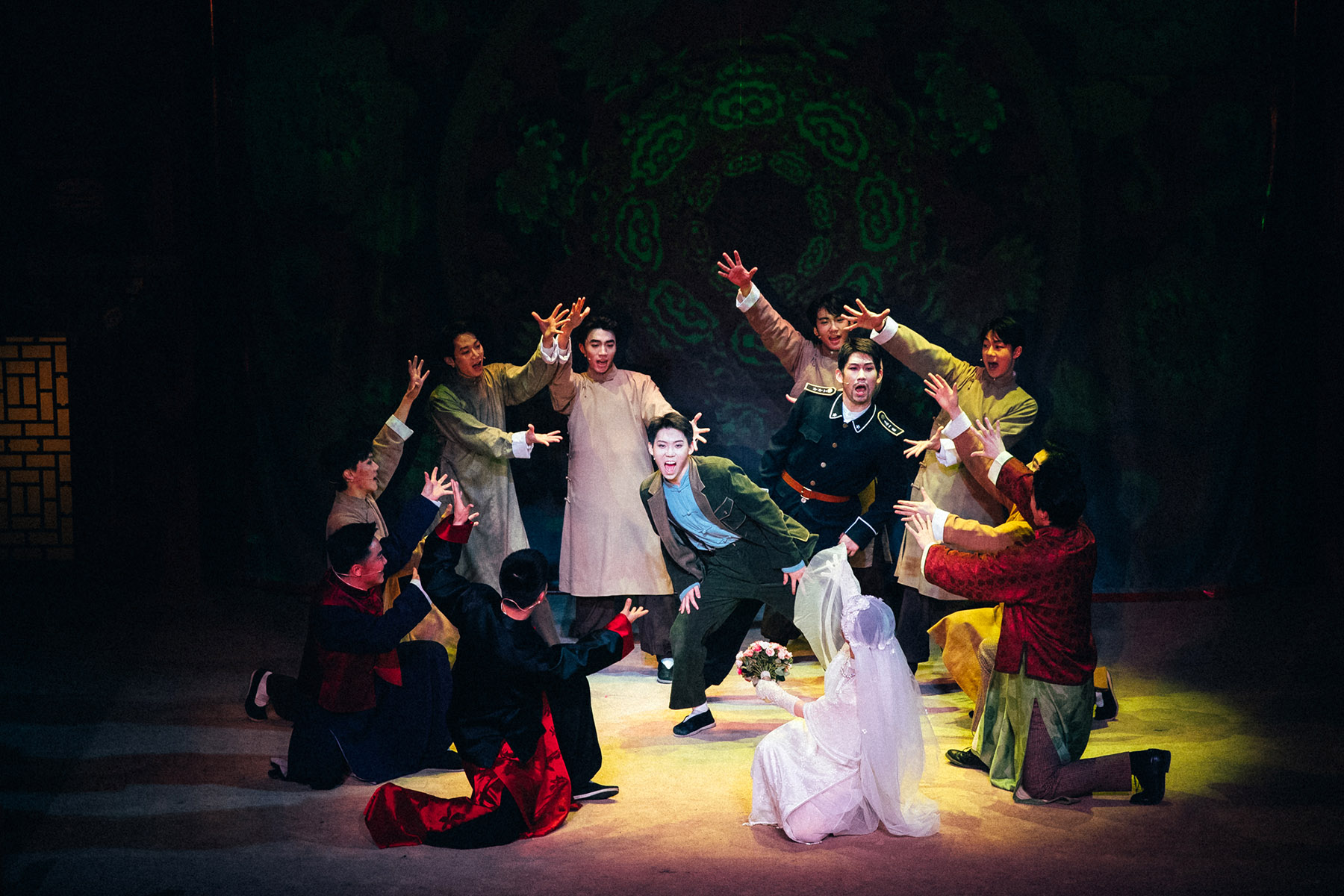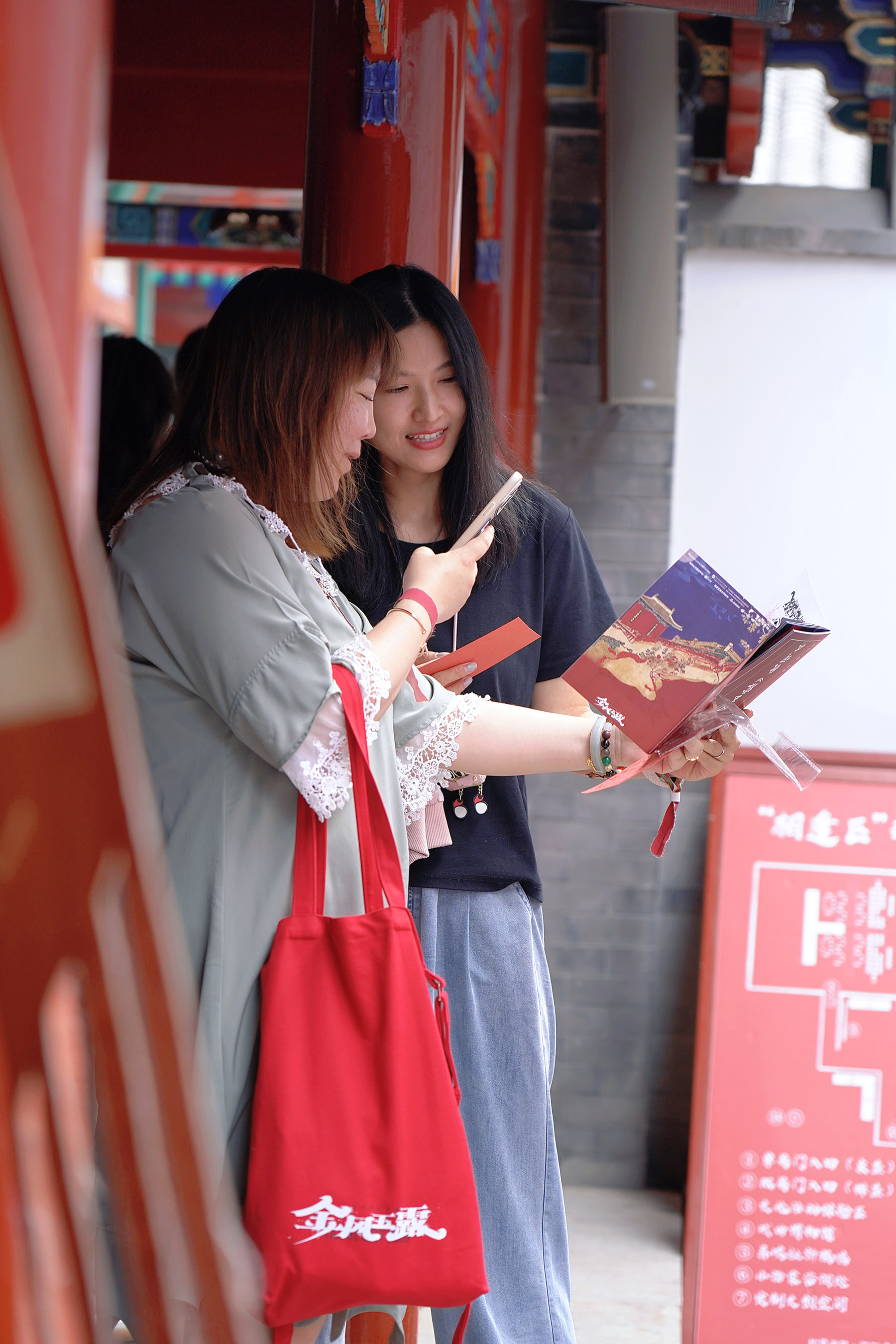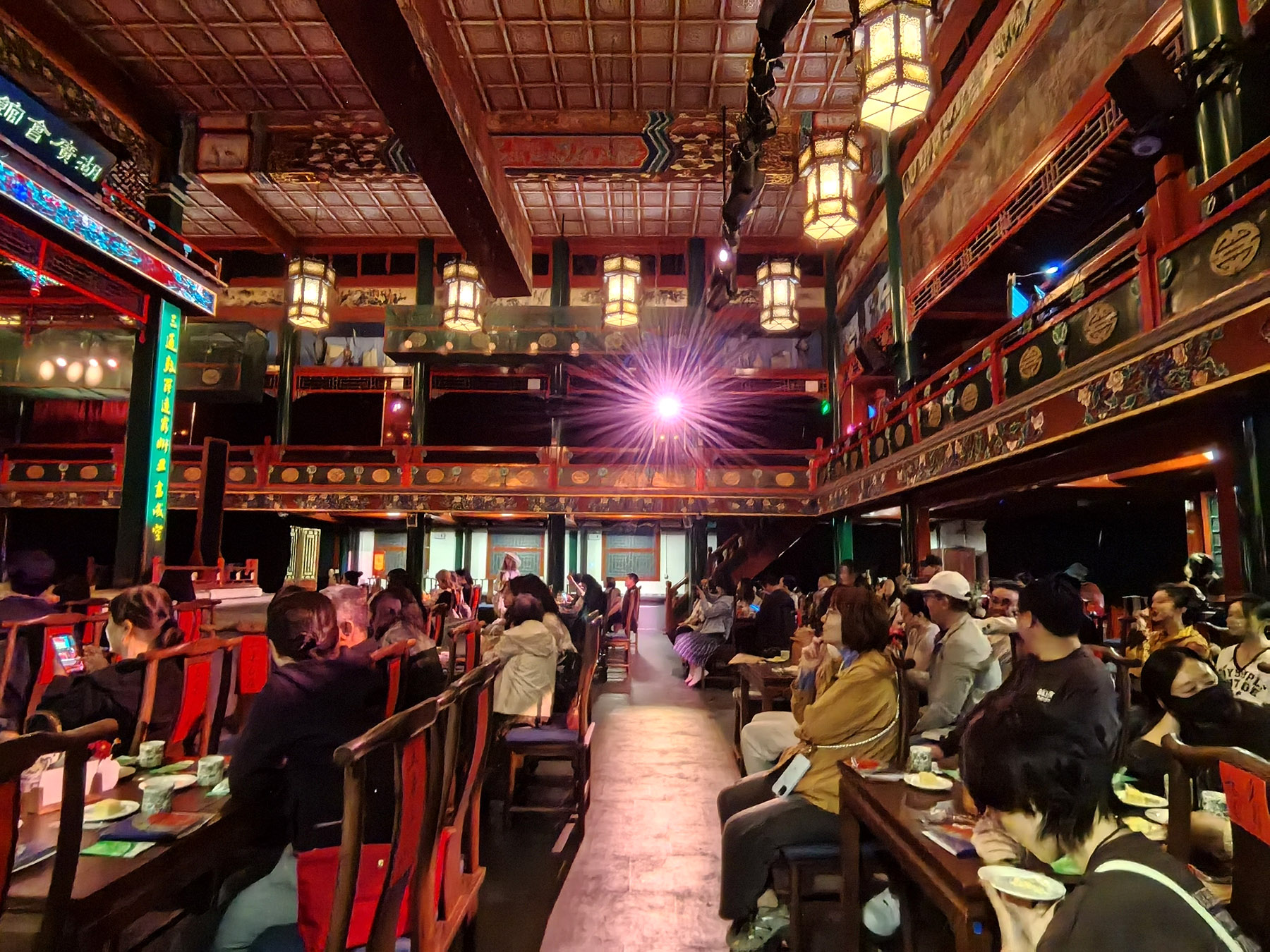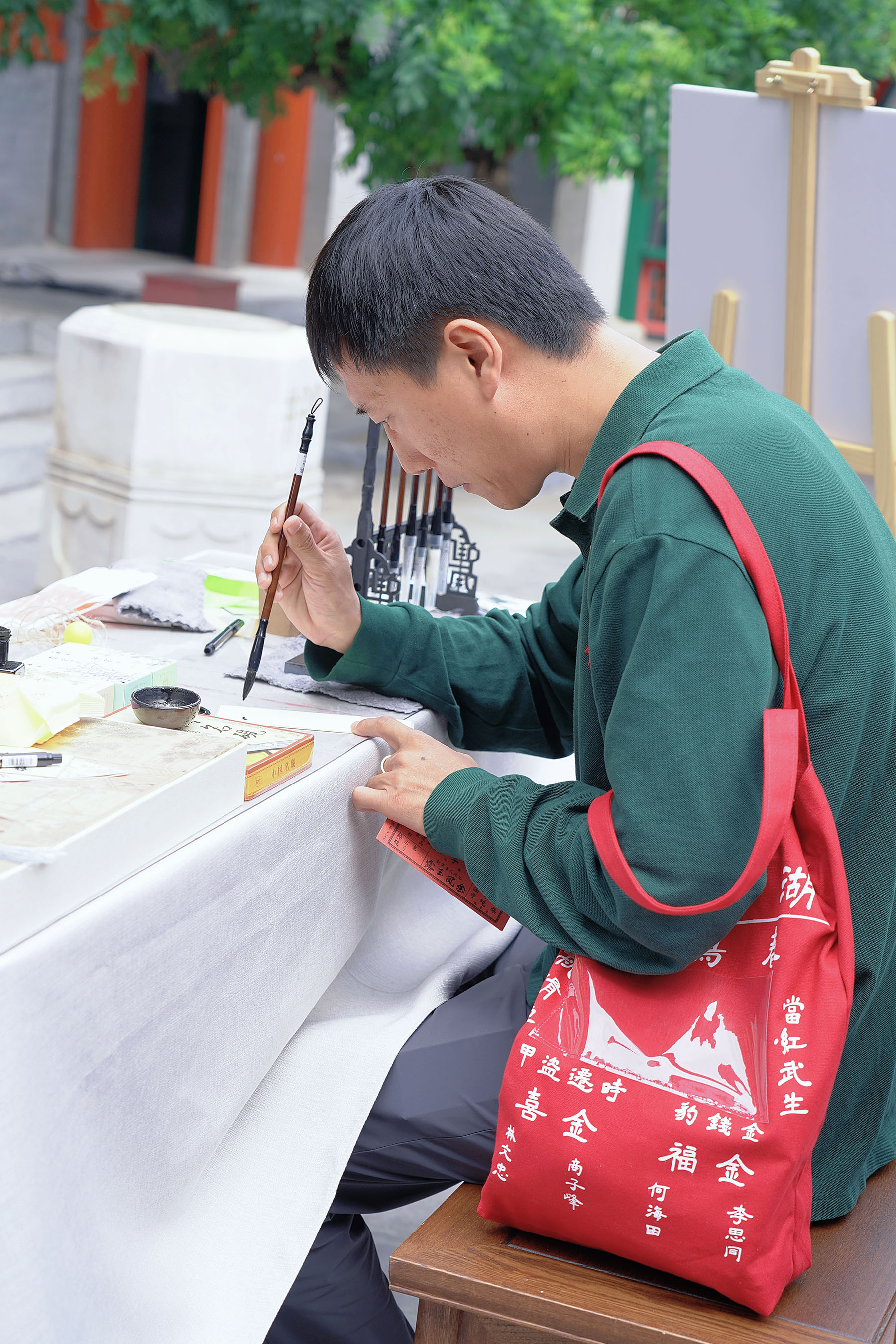Immersive musical helps revive historical opera theater's fortunes, Cheng Yuezhu reports.

Following its inscription as a national key cultural relics protection unit in 2019 and subsequent restoration, the Beijing Huguang Guild Hall reopened to the public at the beginning of last year.
Originally a private Ming Dynasty (1368-1644) residence, the complex was refurbished and expanded during the Qing Dynasty (1644-1911) as a gathering place for people from Huguang, which refers to today's Hunan and Hubei provinces, and a traditional Chinese opera house was added in the 19th century.
This operatic legacy continues today. The site now hosts the Beijing Museum of Traditional Opera, and since 2024, an immersive musical inspired by the venue's history.
READ MORE: Peking Opera show puts musical tale center stage
After its first run from Dec 24 to Jan 25, the musical, Till We Meet Again, greeted audiences on April 30 with a second run. Four performances have been held each week during this run, which ends on Sunday.
The storyline is set around a century ago and follows the journey of a Peking Opera troupe that becomes involved in a murder mystery. Its head is arrested as a suspect, plunging the troupe into crisis. Jin Sheng, the troupe's lead actor, takes on the responsibility of proving their leader's innocence and reviving the troupe.
The audience is seated directly in front of the stage, just like the spectators in the story itself. They sit around square wooden tables with matching chairs. Each table has tea and refreshments, re-creating the classic setup of an old opera house.

The musical was initiated by the Beijing Federation of Literary and Art Circles and coproduced by multiple organizations, including the Jingju Theater Company of Beijing and the Beijing Quju Opera Troupe. Many of the actors have backgrounds in traditional Chinese opera.
Xu Jialin, one of the actors who plays protagonist Jin Sheng, is a 22-year-old student in the department of Peking Opera and Kunqu Opera at the National Academy of Chinese Theatre Arts in Beijing.
He says that due to his background as a traditional opera performer, he can relate to what it was like to be one in the past, adding that most of them were good-natured and dedicated to honing their skills.
"As our teachers always say, 'to learn an art, you must first learn to be a good person'. Only with integrity and sincerity, can we truly understand the character's thoughts and actions in the script," Xu says.
Hu You is an experienced Beijing Quju Opera performer. Taking part in the second run, he describes the process as a meaningful evolution for the cast. Each character is played by two or three actors, and during this run, actors are rotated and regrouped, creating different casts, with fresh chemistry and synergy.
"We have to adjust our performances when we work with different actors. As performers, we might not feel a big difference, but the audience notices, and may prefer different sets of actors," Hu says.
"So in this second run, I think the audience will experience more refined details and a deeper emotional resonance compared to the first run."

Till We Meet Again is Hu's first time starring in a musical. Apart from an enriched learning process to help develop his role in areas such as dancing, swordplay and Kunqu Opera, the experience has left him impressed with musical fans.
"Many audience members have shared their thoughts and reviews on social media, and some are incredibly professional. We've drawn a lot from their feedback. So for us as actors, and for the production as a whole, it's been a really valuable journey of growth," he says.
He was also moved to learn that some of his fans bought tickets to every one of his performances, which motivated him to hone his acting and give something new each time.
Set against the historical backdrop of the ancient complex, the production not only draws from its cultural background to create a compelling story, but also introduces interactive experiences and creative cultural merchandise.
According to Wang Yiwei, one of the producers, the musical will be performed at the venue every May and October, accompanied each time by activities to promote the venue's historical heritage and traditional cultural elements.
For the current run, the creative team has worked to enhance the sense of immersion by designing tickets and handouts inspired by items in the Beijing Museum of Traditional Opera.
"Young musical fans can stroll through the ancient courtyard and buildings, and experience cultural heritage both from our production and the venue," Wang says.
"The moment they step through the gate, they will feel that they have arrived in an ancient theater of traditional opera and be drawn into the story."

The ticket design is inspired by a ticket for a performance by Peking Opera master Mei Lanfang, which is now preserved in the museum. The cast is printed in the style of traditional Chinese calligraphy, and the seat numbers are handwritten by staff.
An accompanying handout mimics the front page of a newspaper from a century ago, with an advertisement introducing highlights of the troupe, and a space where theatergoers can paste a photo of their own.
"Unlike a conventional plot synopsis, our newspaper handout contains hidden clues. The design not only ties into the story, as we have a newspaper vendor character, but also brings the audience into the narrative," she says.
Before and after each performance, audience members can also check out stalls where they can collect stamps, take instant photos, and purchase merchandise.
ALSO READ: Reimagining a legend
The team designed a set of creative experiences inspired by the story. One of its most famous scenes has been turned into a special stamp set. By layering several stamps in different colors on the same sheet of paper, a complex and colorful image is gradually brought to life.
Special events are held during festivals and solar terms (a traditional Chinese system of seasonal markers to divide a year into 24 segments according to the motion of the sun), including intangible cultural heritage experiential activities from April 30 to May 4, during which theatergoers were able to try their hands at calligraphy, makeup, and the making of ronghua (velvet flowers).
"We aim to present more than just a production, but rather a multidimensional project that incorporates history, the museum, education, creative products and tourism," Wang adds.
"There are already people coming from other provinces, and in the future, we hope that the guild hall will become a destination for more travelers seeking in-depth cultural experiences, to see this site-specific production, and to learn about historical architecture, traditional opera and Beijing's cultural heritage."
Contact the writer at chengyuezhu@chinadaily.com.cn


